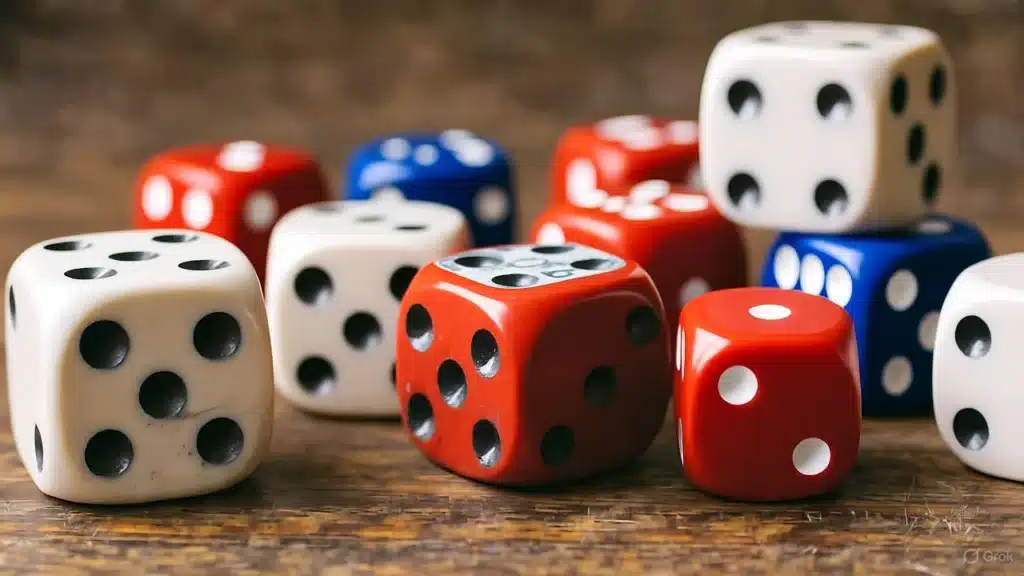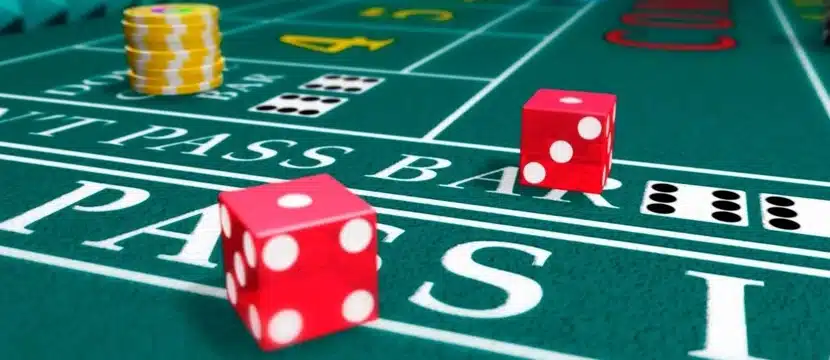
Roll into Thrilling Wins: Your Ultimate Dice Games Casino Tutorial and Guide
Ever felt that rush when the dice clatter across the table, deciding your fate in a heartbeat? In this guide, you’ll discover the magic of dice games casino style, from timeless classics like Craps to exotic Sic Bo and quick-hit crypto versions. We’ll break down rules, odds, and pro tips to boost your edge, plus spots for free play and trusted sites to spin real stakes—sprinkled with stories from players who’ve turned a lucky roll into legend. Get ready to shake things up and chase those payouts like a pro. Visit us here if you want to play Official Game Site
What Are Dice Games in the Casino World?
Dice games have been around forever, from ancient taverns to neon-lit Vegas floors, but online they’ve exploded into fun, fast-paced action. At their core, they’re chance-based bets on how dice will land—simple rolls with big stakes. In casinos, they shine for low house edges and social vibes, whether you’re yelling “seven out!” in Craps or predicting totals in Sic Bo.
Today, dice games online mix tradition with tech: Live dealers for immersion, crypto for anonymity, and RNG for fairness. RTPs often hit 97-99%, beating many slots, with volatility low for steady play or high for jackpot hunts. I remember my first Craps table in a smoky casino; the crowd’s energy made a winning pass line bet feel electric. In 2025, they’re hot for mobile quickies and bonuses, offering unique value like provably fair crypto rolls that let you verify every outcome—no smoke and mirrors.
From “dice games for adults” to family-friendly twists, casinos focus on gambling gems like 2-dice or 3-dice setups. Keywords like “best dice games casino” point to Craps as king, but Sic Bo steals hearts in Asia.
Why Dice Games Rock for Newbies
Quick rounds, easy rules, and that tactile thrill—perfect for dipping toes without drowning in complexity.

Popular Dice Games Casino Picks
Casinos pack variety, but here are standouts based on fun, odds, and buzz. We’ll spotlight three: Craps (2-dice classic), Sic Bo (3-dice ancient), and modern Dice (crypto-style).
Craps: The Table Game Titan
Craps rules the roost with its lively table and bets galore. Players roll two dice; “come out” roll sets point (4-10), then hit it before 7 for pass line wins. House edge? Just 1.41% on pass—top-tier.
Payouts shine: Pass line 1:1, odds bets up to 100x with no edge. A buddy rolled hot streaks at a live table, turning $50 into $300 on odds—crowd went wild.
Sic Bo: Exotic 3-Dice Delight
From China, Sic Bo bets on three dice totals (4-17) or combos. Big/small (4-10/11-17) pays 1:1 with 2.78% edge; triples up to 180:1.
Story time: My cousin tried it online during a trip; a specific triple hit paid 150:1, funding her souvenirs. Low vol for steady rolls, high for risk-takers.
Modern Dice: Crypto Quickies
Spribe’s Dice or BGaming versions let you bet over/under a number (0-100), with 97% RTP. Auto-bet chains wins; multipliers climb fast. Great for “2 dice gambling games” vibes but digital.
Top Dice Games Comparison Table
| Game | Dice # | RTP/Edge | Best Bet | Max Payout |
|---|---|---|---|---|
| Craps | 2 | 98.6% | Pass Line | 100:1+ |
| Sic Bo | 3 | 97.2% | Big/Small | 180:1 |
| Dice | 1-3 | 97% | Over/Under | 99:1 |
How to Play Dice Games Online

Online dice mimic tables with virtual rollers or live cams. Pick a game, set bet (e.g., $1-100), choose wager (pass/total), roll, and collect. RNG ensures fair drops; live uses real dice.
For Craps: Join table, bet pass/don’t, roll if shooter. Sic Bo: Select boxes on layout. Modern Dice: Slider for target, auto-roll.
A pal started with free Craps demo—nailed the lingo in minutes, then cashed real wins. Platforms like BetMGM offer tutorials; always demo first.
Step-by-Step for Beginners
- Sign up at trusted site.
- Claim welcome bonus (e.g., free rolls).
- Load game, adjust bet.
- Place wager, hit roll.
- Cash out smart—set limits.
Key Features of Dice Games Casino
These games pack punch beyond rolls. Low edges (under 5%) beat slots; live chats build community. Crypto versions add provably fair tech—hash checks verify no rigs.
Bonuses? Free bets, cashback on losses. Volatility varies: Craps low for grinders, Sic Bo medium for swings. In 2025, VR tables emerge for immersion.
For “dice roller” fans, apps simulate perfect practice.
Odds and Payouts in Dice Games
Dice payouts hinge on probabilities—know ’em to edge ahead. Craps: 7 most likely (1/6), 2/12 rare (1/36). Pass wins 49.3% time.
Sic Bo: Total 10/11 even odds, but triples 1/216 shot for huge pays.
Modern Dice: 50/50 over/under, but edges creep on extremes.
Quick odds table:
- Craps Pass: 1:1 (244/495 chance)
- Sic Bo Big: 1:1 (48.61%)
- Dice Over 50: ~50% (adjustable)
My first big Sic Bo win? Bet on double 6s—paid 10:1, felt like beating the odds gods.
House Edge Breakdown
Craps shines at 1.36%, Sic Bo averages 2.78%—shop bets wisely.
Bonus Rounds and Special Features in Dice Games
Dice keep it simple, but online adds flair. Craps “fire bets” pay on hot streaks (up to 1000:1). Sic Bo sometimes has side multipliers.
Crypto Dice: Auto-bet with loss recovery, rain bonuses (free credits). Live tables? Side bets like “any triple.”
Imagine a Craps streak: Point hits five times, fire bet cashes 25:1—table erupts. For “5 dice gambling games” like Yacht (Yahtzee casino twist), bonuses on full houses.
Dice Games Free Play and Demo Options
Dip in dry. Free dice games casino demos abound: Spribe Dice at Casino Guru (97% RTP, no download). BGaming’s free roller for practice.
Demos nail rules sans risk—like shadowboxing before the ring. I practiced Sic Bo totals free, spotted patterns, then won $100 real. Search “dice casino game demo” for “3 dice game casino free play.”
Free Play Hot List
- Craps: DraftKings demo.
- Sic Bo: Evolution live free.
- Dice: Rainbet virtual rolls.
Dice Games Download Options
Apps roll anywhere. Dice casino apps like BetMGM for iOS/Android—Craps/Sic Bo included. Crypto: TrustDice APK for seamless bets.
Download for offline sims or live links. PC? Browser fine, but apps push notifications. For “dice games download,” official avoids wolves.
App Essentials
- Size: Under 100MB.
- Features: Push bets, history.
Tips and Strategies for Winning at Dice Games
No sure bets, but edges sharpen. Craps: Stick pass/odds—lowest house. Sic Bo: Big/small for steady, avoid triples unless bold.
Bankroll: $200/session, 1% bets. Track streaks; quit up 20%.
Story: Uncle bet don’t pass in Craps (opposite crowd)—cashed when 7-out hit, up $150 calm as can be. For “best dice games,” Craps strategies like iron cross hedge risks.
Strategy Bullets by Game
Craps:
- Pass line + odds.
- Avoid prop bets (high edge).
Sic Bo:
- Combo bets for balance.
- Skip singles (9% edge).
Dice:
- Martingale on even (cautious).
Trusted Platforms for Dice Games Online
Safety first—EEAT means licensed, audited sites. BetMGM tops for US Craps/Sic Bo, fast pays. BetMGM
FanDuel for live tables. FanDuel
Crypto: Vave for Dice, provably fair. Vave
Stars777 Casino offers dice with bonuses—great for “dice games casino free play.” Stars777 Casino
Teen Patti Stars mixes cards/dice for Indian vibes. Teen Patti Stars
All SSL-secure, RNG-tested. Internal: Casino tips or Free demos.
Trust Factors Table
| Platform | License | Dice Variety | Bonus |
|---|---|---|---|
| BetMGM | NJ | Craps/Sic Bo | 100% match |
| Vave | Curacao | Crypto Dice | 150% crypto |
| Stars777 | PAGCOR | Asian Dice | Free rolls |
Common Mistakes to Avoid in Dice Games
Chasing 7s in Craps? House loves props (16% edge). Overbetting in Sic Bo triples losses.
No bankroll? Rolls to ruin. Ignoring bonuses skips free edges.
Pitfall Pointers
- Prop bets: Fun, but feast/famine.
- Alcohol: Clouds calls.
- Unlicensed: Rig risks.
Real Player Stories from Dice Games Casino
Folks roll epic yarns. One Craps shooter hit 20-point rolls—$1k odds payout, table toasted him. Sic Bo sharer: “Bet small on dragon—150:1, bought the family dinner.”
Forums glow: Free Dice demo led to crypto wins. My group: Virtual Craps night, hot streak funded pizza—bonds over bounces. Highs hype, lows humble.
Memorable Rolls
- “Sic Bo triple 1s—180:1, life changed!”
- “Craps cold table—don’t pass doubled my stack.”
Dice Games Variations: From 2 to 5 Dice Thrills
Base on 2 (Craps), but “3 dice game casino” like Sic Bo adds combos. “5 dice gambling games” echo Yahtzee bets—full house pays 8:1.
“2 dice gambling games”: Street craps simple. Crypto twists: Multi-dice chains.
Demos compare: Craps for social, Dice for solo speed. “EA DICE games”? That’s video dev—stick casino.
Variation Vibes
- 2 Dice: Quick, low edge.
- 3 Dice: Exotic pays.
- 5 Dice: Strategy layers.
Mobile Gaming Tips for Dice Games On the Go
Apps dice anywhere. BetMGM’s rolls smooth on phones—pinch-zoom tables. Battery saver? Low graphics.
Tale: Airport Sic Bo app, hit big/small streak—flight funded snacks.
Mobile Mastery
- Portrait: Easy taps.
- WiFi: Live streams crisp.
Understanding RTP and Volatility in Dice Games
RTP 97-99% means $97-99 back per $100 rolled long-term. Low vol (Craps) for even play; medium (Sic Bo) mixes.
House edge flips it—lower better. Crypto Dice? Adjustable for risk.
Edge Essentials
Craps: 1.4%—grinder gold. Sic Bo: 2-30% bet-dependent.
Promo Hunting: Dice Games Free and Bonuses
Snag free rolls: BetMGM’s $25 no-dep for Craps. “Free dice games casino” like BGaming’s unlimited demos.
Stars777: Dice cashback. Wagering? 20-30x typical.
Friend grabbed free Sic Bo spins—cashed $50 without deposit.
Bonus Bites
- Welcome: 100% + free bets.
- Reload: Weekly dice boosts.
Author Info
Written by Alex Rivera, a gaming enthusiast with over 10 years reviewing casino classics. Alex has rolled tables from Vegas to virtual, focusing on fair, fun edges. Contact: [email protected]
Game Developed By
Various: Evolution for live Sic Bo/Craps, Spribe/BGaming for digital Dice—innovators in fair-play RNG.
Date Updated
October 24, 2025
Ready to Roll the Dice? Jump into Casino Action Now!
You’ve got the odds stacked—time to throw. Head to Stars777 Casino for dice games casino free play and grab bonuses. Demo a Craps table, download the app, or bet real on Sic Bo. Your lucky seven awaits—play smart, roll hot, and may the dice be ever in your favor!
Mini Games
Discover the Excitement of Online Dice Games
Experience the Thrill of Hilo Games – A Guide to Winning
Exploring the Excitement of Keno Games
Plunging into Plinko – A Guide to the Popular Game
Take Flight with Aviator – The Ultimate Gaming Experience
Uncover the Adventure – Exploring Mines Games Online
Read Our Blogs
- Teen Patti Bonus vs Cashback – Which Is Safer?This page aims to help Indian players understand the differences between Teen Patti bonuses and cashback offers, focusing on safety aspects to make informed choices in online gaming. Introduction: Why Players Get Confused Between Bonuses and Cashback Many Indian players diving into online Teen Patti often mix up bonuses and cashback. Both seem like ways…
- Online Casino Christmas Rewards: Unwrap Festive Bonuses and Wins in 2025The holiday season is here, and what better way to celebrate than with thrilling online casino games packed with Christmas rewards? If you’re new to this or just looking for some festive fun, imagine logging into a game and instantly getting bonus chips, free spins, or even cash rewards to boost your play. It’s simple:…
- Real Money Casino Games: What’s Coming in 2026Hey, remember that rush from your first big win on an online slot—the screen lighting up, your heart skipping a beat, and suddenly your coffee tastes a whole lot sweeter? That’s the magic of real money casino games, isn’t it? But as we wrap up 2025 here on December 11, staring down the barrel of…
- Real Cash Casino Games 2025–2026: What’s New for Players?Picture this: It’s a rainy evening in Mumbai, and instead of staring at the TV, you’re at a virtual blackjack table, chatting with folks from Delhi and Dubai, your bets zipping through in seconds via your phone. No smoke-filled rooms, no travel hassles—just pure, pulse-racing fun with real stakes. That’s the promise of real cash…
- 2025–2026 Real Money Gaming Upgrade: New Features RevealedIn the fast-paced world of online entertainment, real money gaming continues to captivate millions, blending thrill with the potential for rewards. As we step into late 2025, the industry is on the cusp of a transformative era for 2025-2026. Gone are the days of static slots and basic card games; today’s upgrades promise smarter, safer,…
- Online Casino Transactions in India 2025: Complete Guide to Safe & Fast PaymentsAs India’s digital economy touches new heights, millions of players search every day for “online casino payment methods India 2025”, “fastest casino deposit in India”, or “safe online casino transactions India”. With the new Online Gaming Act 2025 now in force across most states, the way money moves in and out of gaming platforms has…
- Best Online Casinos Accepting PayPal in India 2025In the vibrant world of online entertainment, Indian players often seek seamless ways to enjoy casino games while prioritizing security and convenience. With PayPal’s global reputation for fast, encrypted transactions, it’s a top choice for many searching “PayPal casinos India 2025.” However, the landscape has shifted dramatically due to recent regulations. This guide provides an…
- Deposit Guide to Teen Patti in IndiaTeen Patti, often called the Indian version of poker, has captured the hearts of millions across the country. As online gaming platforms grow in popularity, understanding how deposits work in these games becomes essential for enthusiasts. This deposit guide explores the key aspects of funding your Teen Patti account in India, highlighting reliable methods, safety…
- Safe Teen Patti APK Download for Indian Players in 2025In 2025, with India’s gaming landscape shifting due to new regulations, finding a safe Teen Patti APK download has become more crucial than ever for Android users in the country. If you’re an Indian player searching for “safe Teen Patti APK download for Android 2025” or “best free Teen Patti apps without real money in…
- Teen Patti Real Money: How to Play and Win in IndiaTeen Patti, often called Indian Poker, is a thrilling card game that’s exploded in popularity across India, especially when played for Teen Patti real money. If you’re searching for “how to play Teen Patti real money online in India” or “best strategies to win Teen Patti cash games,” this guide is your one-stop resource. Rooted…
